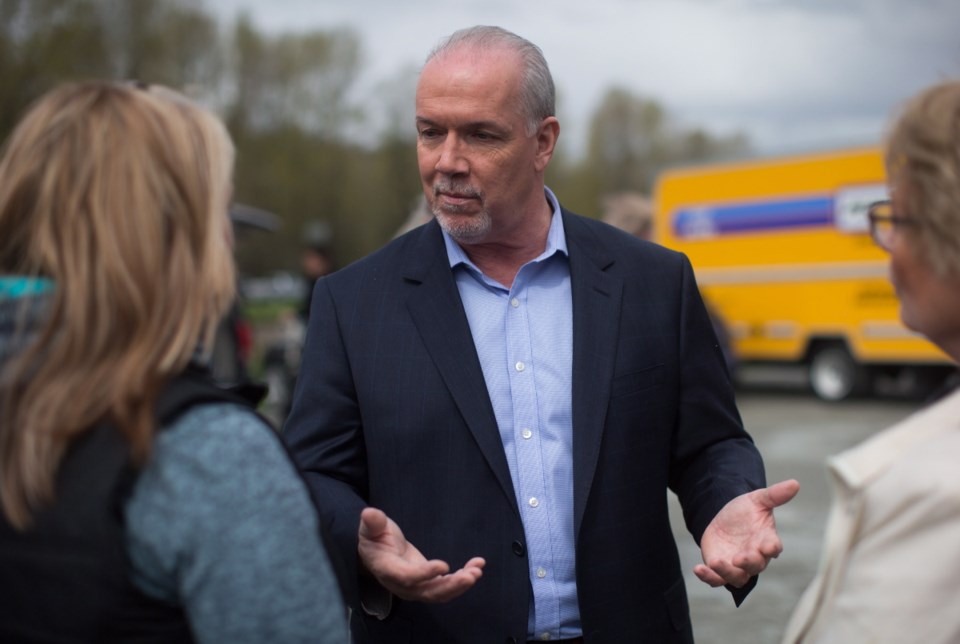The B.C. Greens and NDP both hope to address criticism of B.C. Liberal fundraising tactics by promising sweeping political finance reforms if elected May 9.
Green Party Leader Andrew Weaver rolled out commitments Monday to ban political donations from unions, corporations and non-residents of B.C., place annual limits on individual donations, and prohibit cabinet ministers from engaging in partisan fundraising activities while in office.
The Green Party stopped accepting corporate and union donations last September and Weaver believes the issue continues to resonate with voters.
“It boils down to the issue of trust,” he said, while campaigning in his Oak Bay-Gordon Head riding on Monday. “How can you trust somebody to make decisions on your behalf when they’re accepting vast quantities of money from corporations and unions?”
NDP Leader John Horgan made similar promises last week, as both parties hope to capitalize on repeated broadsides against B.C. Liberal “cash-for-access” fundraisers, in which donors paid thousands of dollars to attend dinners with Leader Christy Clark and her ministers.
The NDP platform, like the Greens’, calls for a ban on corporate and union donations, limits on individual contributions and a prohibition on out-of-province donations.
Gary Holman, incumbent NDP candidate in Saanich North and the Islands, said his party began pushing for political financing reforms long before Weaver arrived in the legislature four years ago. “We’ve presented private members’ legislation six times and it’s been rejected every time by the Liberal government,” he said.
Weaver has accused the NDP of hypocrisy for continuing to accept union donations while calling for a ban. But Holman said the NDP is playing by existing rules and remains committed to changing the law once in office.
“We are not going to fall on our sword on the eve of a provincial election fighting the most moneyed government in Canadian history,” he said. “We’re not just wanting to elect one or two other Greens; we’re wanting to form a government in British Columbia and we need to fight that fair fight. We’ll play by the rules and then we’ll change the rules.”
The B.C. Liberals have rejected a ban on corporate and union donations, arguing that it would lead to taxpayers subsidizing political parties. The party favours more frequent disclosure of donors and their contributions.
“I believe that British Columbians want transparency from political parties about their fundraising,” Vancouver-Quilchena Liberal candidate Andrew Wilkinson said in a statement Monday. “That is why the B.C. Liberal Party proactively discloses our donations in real time. Unfortunately, the B.C. NDP and Green Party have refused to tell British Columbians who is donating how much to them — until after the election.”
The B.C. Liberal platform promises to amend the Elections Act to require “real time” disclosure by all parties. The Liberals introduced similar legislation in the most recent sitting of the legislature, but failed to pass it before the session ended.
The Liberals also intend to commission an independent panel to review proposals for improving B.C.’s political fundraising system. “We believe that these decisions should not be made by politicians,” Wilkinson said.
Holman, who has been the NDP’s point person on democratic reform issues, agrees with Weaver that the Liberals are vulnerable on the issue of big money in politics. “I hear it at the doorstep every day, including from folks who voted Liberal in the past. Certainly, in my constituency, which I know best, it’s really ringing a bell. People are sick and tired of it.”
Meanwhile, Weaver announced Monday that a Green government would replace B.C.’s first-past-the-post electoral system with a proportional voting system in time for the 2021 election.
He said the change will be made without a referendum. “A referendum will be brought in after the people of B.C. have had a chance to explore what it means to actually elect MLAs through proportional representation.”
Holman said previous referendums on changing the voting system have failed, so voters would be “disrepected” if there’s a unilateral change without getting a clear mandate to do so. He said an NDP government will hold a referendum on switching to proportional representation and campaign for the “Yes” side.
More election coverage, A4
timescolonist.com/bcelection



